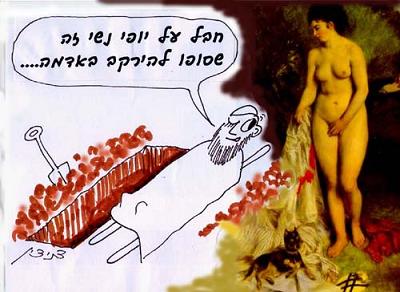
One of the commands which G-d gave the people of Israel when they entered the Land was to destroy the nations residing in the land and not make treaties with them. It is written “When the Lord your G-d brings you into the land which you go to possess, and has cast out many nations before you, the Hittites and the Girgashites…you shall conquer them and utterly destroy them. You shall make no covenant with them nor t’chanem” (Deuteronomy 7:1-2). The sages interpreted the prohibition on t’chanem as prohibiting giving the gentiles chen, that a Jew may not say how pleasant are the actions of a gentile, how beautiful is a gentile woman, etc. The scholars asked: When the early sage Rabban Shimon son of Gamliel saw an especially beautiful gentile woman he praised her and said “How wondrous are your creations, O G-d.” Thus did Rabbi Akiva act when he saw the feminine beauty of the wide of the Roman commissioner in Israel [Tineius Rufus] he would weep and say what a shame it was that such feminine beauty would end up rotting in the grave. Answer: One may praise G-d for creating beautiful women, but one is forbidden to praise the gentiles themselves. The scholars then asked about the actions of Rabban Shimon son of Gamliel who saw a beautiful woman and Rabbi Akiva, who saw the wife of the Roman commissioner: Is one then permitted to look at women? The early sages had ruled that one if forbidden to look at a beautiful single girl or any married woman, even if she were ugly. The wife of the Roman commissioner was both beautiful and married. Answer: These sages met these beautiful woman by surprise and had no chance to close their eyes or move aside, for example, they met at a corner where a wall blocked their vision on all sides.
(Babylonian Talmud, Tractate Avodah Zarah 20a-b)
